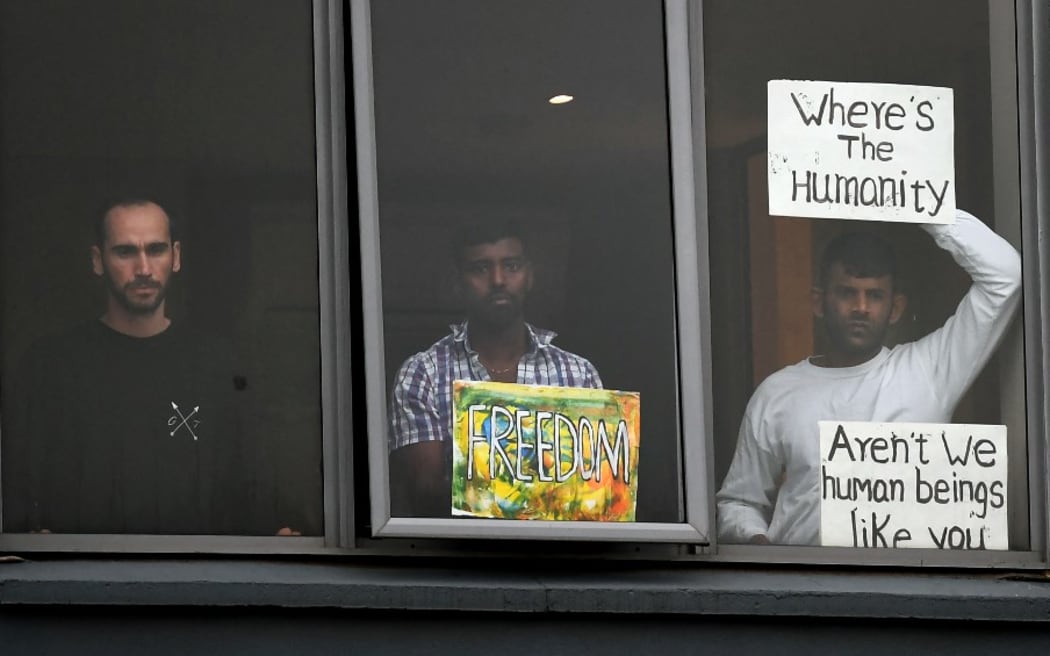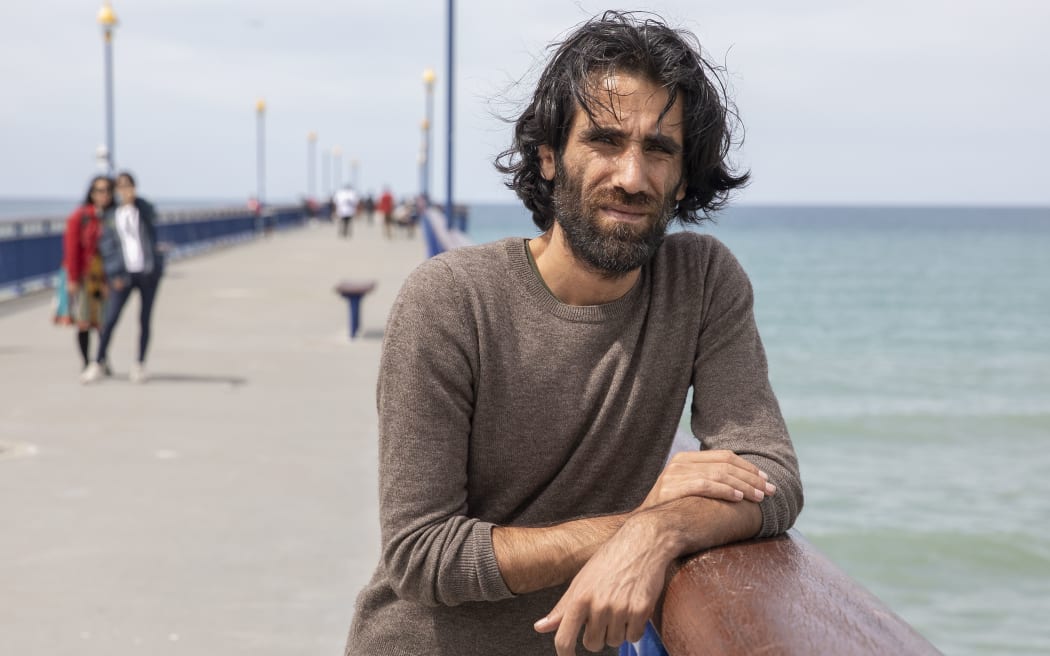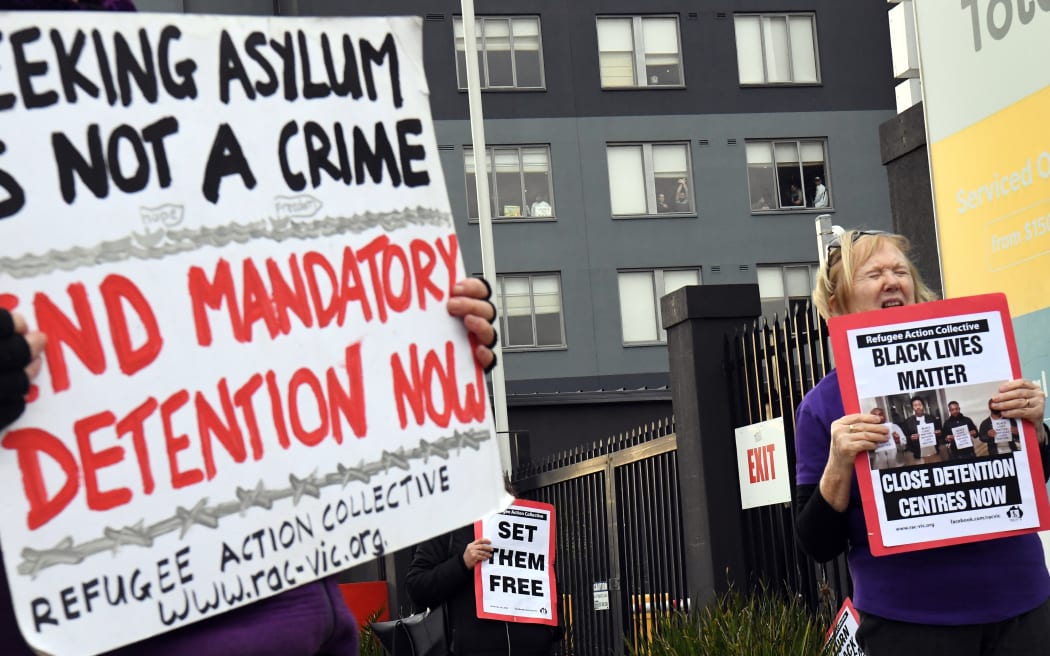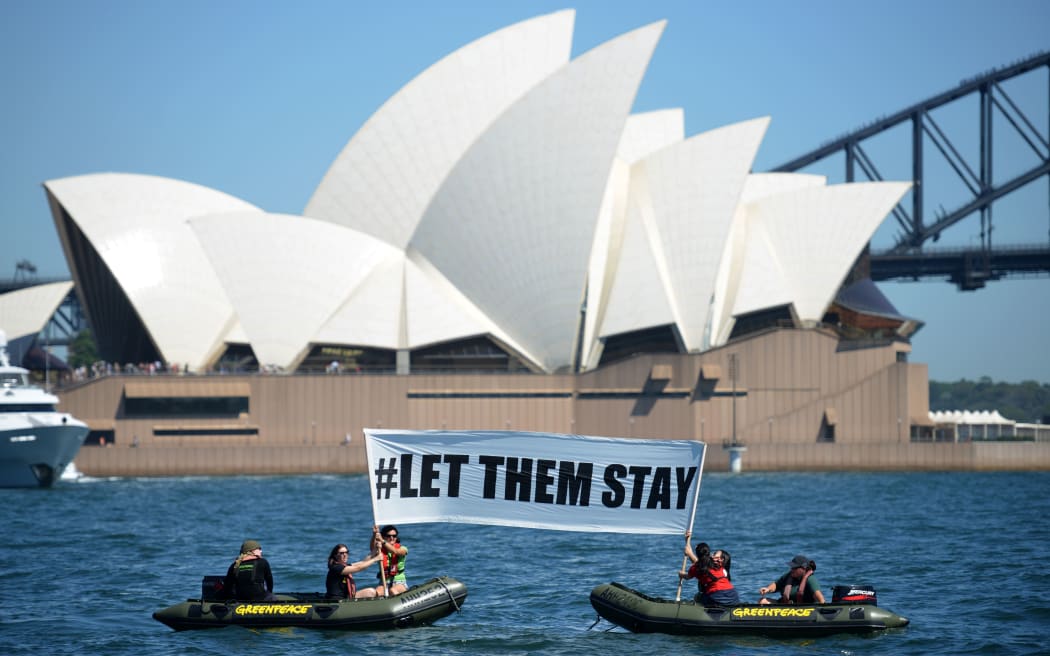By Zoe Osbourne for the BBC
“My son was 14 when we came to detention, and he’s now 24 – it’s not fair.”

Photo: AFP
Salah pauses. He and his son Mustafa had been launched from Australian immigration detention final month together with six different refugees who had been being detained at Melbourne’s Park Hotel, the infamous detention venue the place tennis star Novak Djokovic was held earlier this yr.
Salah, 51, says they’ve misplaced an excessive amount of time. He and the opposite refugees did not do something fallacious, he says, so why did they wait 9 years to be launched?
And why has it out of the blue occurred now?
The father and son got here to Australia by boat in 2013, just after the nation signed two controversial offers with Papua New Guinea and the tiny island nation of Nauru to detain its maritime refugees exterior Australia. The pair had been held on Nauru for a number of years.
Salah would not wish to disclose the place he’s initially from, citing his and his household’s security. He says he selected Australia as a result of “everyone told me [it] is number one for human rights”.
In actuality, the offshore methods grew to become infamous for his or her poor and harmful circumstances, which critically traumatised some refugees, together with youngsters.
Dozens of refugees stay within the two Pacific nations, however some had been dropped at detention in Australia in 2019 below a medical evacuation invoice dubbed Medevac, and some others, like Salah and Mustafa, have been transferred since.
Of his launch final month, Salah stated: “Anyone they asked me, ‘Salah are you happy?’ Happy after nine years?.. Why [were] some families with me here five years ago, six years ago, seven years ago [released before us?]”
‘Voters will not tolerate this coverage any extra’
Salah’s launch is a part of an even bigger image.
More than 50 refugees have been launched into Australia up to now few months, the ABC reported, and the federal government signed a take care of New Zealand in March for 450 refugees to be resettled there over three years.
The Department of Home Affairs didn’t reply to the BBC’s questions in regards to the timing. But many have pointed to the Australian election on 21 May, suggesting Scott Morrison’s authorities is making an attempt to neutralise an emotive political problem.

Author Behrouz Boochani spent six years in Australian offshore detention and was granted refugee standing in New Zealand.
Photo: AFP
They embody Behrouz Boochani, award-winning writer and political refugee, who spent six years in Australian offshore detention and who was granted refugee standing in New Zealand.
“Over the past two decades… always a month or two months before the election, something happened for refugees,” he stated. “The government introduced a new policy or they do something.”
He thinks it indicators a “political shift” amongst Australia’s voters who’re “not going to tolerate this policy anymore”.
Ian Rintoul, activist and spokesperson for the Refugee Action Coalition, agrees the releases are merely an “opportunistic calculation” by the Australian authorities.
They could also be linked to the press storm round maritime refugees from earlier this yr when Djokovic was detained, he says.
But he believes there’s additionally a “growing appreciation and awareness of the cruelty that’s associated with the Park Hotel and the Medevac refugees”, and a notion there was nothing to be gained from withholding their freedom.
Rintoul feels the timing of the New Zealand resettlement settlement might be an indication that Prime Minister Scott Morrison is anticipating an election loss.
While that settlement has been below dialogue for years, he says, it not too long ago emerged that it was the crux of a secret deal between an unbiased Australian Senator, Jacqui Lambie, and the prime minister.
The deal was reportedly to get folks off Nauru and PNG earlier than the tip of Morrison’s time period, in trade for Lambie’s assist to repeal Australia’s Medevac legal guidelines, which gave docs extra energy to determine if asylum seekers needs to be let into Australia for medical care.

Photo: AFP / William West
‘Bouncing from one disaster to a different’
Successive Australian governments have imposed hardline insurance policies on refugees for many years, arguing that they stop deaths at sea and deter human trafficking.
The Department of Home Affairs advised the BBC its method has not modified.
“People who travel illegally to Australia by boat will not permanently settle in Australia,” a spokesperson stated, with out clarifying that it isn’t unlawful to hunt asylum.
Human rights lawyer Alison Battison believes current developments are just the newest in a protracted historical past of “bounc[ing] from one crisis to another” over refugee coverage.
There is not any long-term plan for the folks nonetheless detained on PNG and Nauru, she says, just as there was no plan for these moved to Australia for medical remedy.
Neither the New Zealand deal nor releasing refugees into the group offers an answer to the problem of maritime arrivals in Australia, she provides.
Those refugees who’re given their freedom face new struggles.
Hossein Latifi was launched from immigration detention in April. He stated the federal government “kicked [them] out without anything after nine years.”
He obtained 4 weeks of free lodging in a Melbourne suburb, and A$240 with some meals to cook dinner. At first he wasn’t even given a room with a kitchen in order that meals was ineffective. After the 4 weeks, he will likely be left to fend for himself.
Hossein, together with many not too long ago launched refugees, was given a bridging visa – a short lived six-month visa designed for people who find themselves getting ready to go away Australia.
The relaxation have been placed on “residence determination” – a type of detention the place refugees stay locally, however the Australian authorities is chargeable for their care.
“So people who have significant physical and mental health issues are then given these residence placements. In some cases, needing significant psychological assistance, because they are so distorted from detention,” says Battison.
“The government recognises that what has happened to the refugees in its care has left them unable to work to support themselves,” she provides. “That’s quite an extraordinary implied admission.”
The Department of Home Affairs didn’t reply to that declare when contacted by the BBC.

Members of Greenpeace maintain up an indication in entrance of the Opera House in Sydney on February 14, 2016.
Photo: AFP PHOTO / Peter PARKS
‘They misplaced their alternatives’
People on bridging visas typically discover it onerous to outlive too, Battison says.
“You can’t get a loan, you can’t get a job that has any sense of security because why would anyone give you such a job when you have to keep renewing your visa every six months?”
Refugee Boochani says many additionally discover it unattainable to “cope with those years that they lost” to detention.
“If you lose your life, nine years in detention, if you lose it, you start to ask… why? They lost their opportunities, they lost their chances.”
Salah has an interview in May for resettlement in Canada. If he stayed in Australia, his bridging visa would not permit him to sponsor his household to hitch him.
But he has already been ready for 3 years to be accepted by Canada, and no refugee who has began an software course of to be resettled in Canada or the US is eligible for the New Zealand deal.
For now, Salah and Hossein are targeted on restarting their lives. Hossein says that the state of affairs in detention was “designed to break [him]”, nevertheless it solely made him stronger.
“I believe in myself, I’ll be successful. I believe in other refugees, they will be successful,” he says.
But realistically their future continues to be not sure.
“You plan to do something and you say no, I’m here for just six months,” says Hossein. “There is no any guarantee… this is some kind of pressure, stress.”
Salah says that he’ll nonetheless discover a job.
“I have many [skills] – I am mechanic and a chef, and [I can] drive forklift,” he says. “I have many jobs. I can work here.”
But his final want is to be reunited together with his spouse and his different son.
“I [hope to] finish my paper to New Zealand or Canada… because if I go [there] I know my life,” he says. “I know my future.”
– BBC
